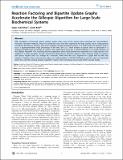Reaction Factoring and Bipartite Update Graphs Accelerate the Gillespie Algorithm for Large-Scale Biochemical Systems
Author(s)
Indurkhya, Sagar; Beal, Jacob S.
DownloadIndurkhya-2010-Reaction Factoring a.pdf (268.9Kb)
PUBLISHER_POLICY
Publisher Policy
Article is made available in accordance with the publisher's policy and may be subject to US copyright law. Please refer to the publisher's site for terms of use.
Terms of use
Metadata
Show full item recordAbstract
ODE simulations of chemical systems perform poorly when some of the species have extremely low concentrations. Stochastic simulation methods, which can handle this case, have been impractical for large systems due to computational complexity. We observe, however, that when modeling complex biological systems: (1) a small number of reactions tend to occur a disproportionately large percentage of the time, and (2) a small number of species tend to participate in a disproportionately large percentage of reactions. We exploit these properties in LOLCAT Method, a new implementation of the Gillespie Algorithm. First, factoring reaction propensities allows many propensities dependent on a single species to be updated in a single operation. Second, representing dependencies between reactions with a bipartite graph of reactions and species requires only O(n) storage for n reactions, rather than the O(n[superscript 2]) required for a graph that includes only reactions. Together, these improvements allow our implementation of LOLCAT Method to execute orders of magnitude faster than currently existing Gillespie Algorithm variants when simulating several yeast MAPK cascade models.
Date issued
2010-01Department
Massachusetts Institute of Technology. Computer Science and Artificial Intelligence Laboratory; Massachusetts Institute of Technology. Department of Electrical Engineering and Computer ScienceJournal
PloS one
Publisher
Public Library of Science
Citation
Indurkhya, Sagar, and Jacob Beal. “Reaction Factoring and Bipartite Update Graphs Accelerate the Gillespie Algorithm for Large-Scale Biochemical Systems.” PLoS ONE 5.1 (2010): e8125. © 2010 Indurkhya, Beal.
Version: Final published version